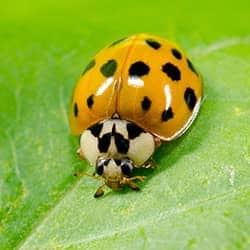Yes. Asian lady beetles are a problem every fall. Not just in Thompson's Station, but throughout our Middle Tennessee service area. But how bad these beetles will be on your property depends on many factors.
Before we discuss the factors that can lead to an increase in Asian lady beetles, let's first make sure we're talking about the same insect. Homeowners often get Asian lady beetles and ladybugs mixed up. It is important that you don't confuse the two. Asian lady beetles are significant pests that can congregate by the thousands on a home.
An Asian lady beetle will be yellow, orange, or black in coloration. Some have as many as 22 spots. Some have no spots at all. A distinctive mark to look for is the w marking on the base of its head.
Though Asian lady beetles are not a threat to people, they can be a significant nuisance pest in general, and a frustrating pest for folks who have fruit trees.
What makes Asian lady beetles worse?
These are crop pests. They were introduced into the United States for the purpose of bioremediation of aphids. If you live in an area that has farms nearby, you may get more and more of these insects simply because their populations are growing in this state. There isn't a whole lot you can do about that.
If you have crops, fruit trees, or an abundance of plants, then you are sure to have aphids--and those aphids are going to attract Asian lady beetles. These plants need to be reduced or you need to hire a professional to mist your landscaping.
What can you do about Asian lady beetles?
We've found that the best way to deal with overwintering pests is to treat the foundations of homes. This prevents these beetles from hiding in cracks and crevices when they congregate on the warm side of homes during the fall. It also prevents them from gaining entry and finding harborage for the winter.
If you're dealing with an Asian lady beetle problem, or you'd like help reducing lady beetles around your home this fall, our Perimeter Plus pest control program works to reduce Asian lady beetles, stink bugs, boxelder bugs, flies, spiders, and several other household pests, before they get in. Go here to learn more.
 1435 Reviews
1435 Reviews


